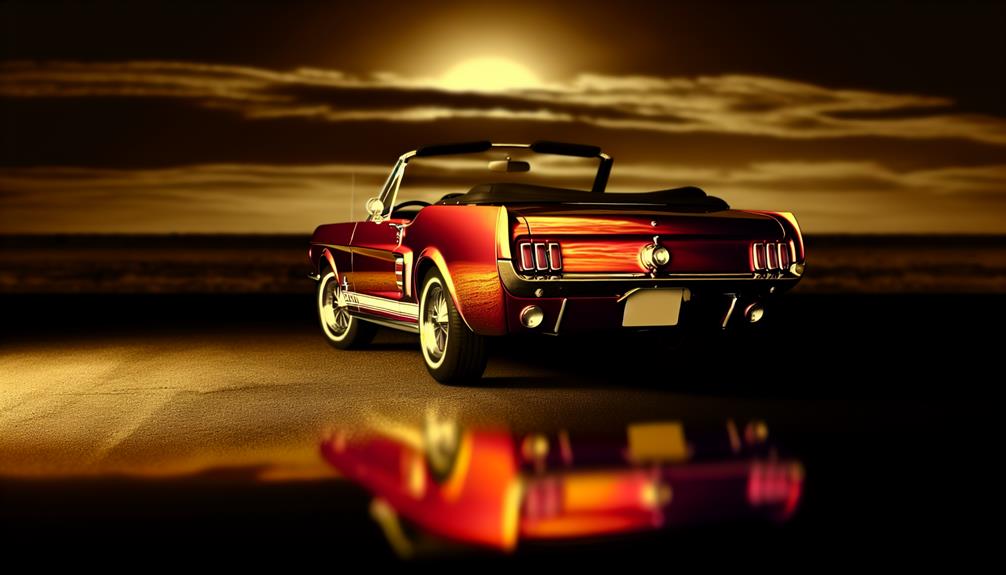Do you ever catch yourself turning your head to admire a vintage Chevrolet Camaro or a sleek Jaguar E-Type as it glides past? Classic cars have a way of capturing our attention and igniting a sense of wonder. But what about these timeless vehicles that continue to captivate generations of enthusiasts? The allure of classic cars goes beyond mere nostalgia; it stems from their historical significance, impeccable design, and the emotional connection they evoke. As we explore the elements contributing to their timeless appeal, we unravel the fascinating story behind these automotive icons.
Historical Significance
The historical significance lies at the very heart of classic cars, as they offer a tangible connection to the past, transporting you back in time to experience the elegance, innovation, and cultural milestones of bygone eras. Classic cars are not just vehicles; they are living pieces of history that have shaped the automotive industry and continue to influence it today.
When classic cars first hit the roads, they revolutionized the automotive industry. Their cutting-edge designs, advanced technologies, and superior performance set new standards and paved the way for future developments. Classic cars introduced innovations such as power steering, disc brakes, and fuel injection, which have become integral to modern vehicles. Their influence on the automotive industry cannot be overstated.
Preservation efforts play a crucial role in maintaining the historical significance of classic cars. Car enthusiasts, collectors, and organizations dedicated to preserving these automotive treasures ensure that these iconic vehicles are safeguarded for future generations to appreciate and study. These individuals and groups ensure that classic cars remain a tangible link to our past through meticulous restoration, maintenance, and documentation.
The historical significance of classic cars extends beyond their influence on the automotive industry and preservation efforts. They embody the spirit and values of their respective eras, reflecting the culture, societal shifts, and technological advancements of the time. Owning and experiencing a classic car allows you to immerse yourself in the rich tapestry of history, capturing the essence of a bygone era with every turn of the wheel.
Design and Aesthetics
When you look at a classic car, its design and aesthetics immediately captivate you, taking your breath away with its timeless beauty and attention to detail. Classic cars are not just vehicles; they are works of art, showcasing their designers’ artistic expression and creativity. The design of a classic car reflects the era it was created in, capturing the spirit and style of that time. From the sleek curves of a 1950s Chevrolet Bel Air to the bold lines of a 1960s Ford Mustang, each classic car has its own unique charm and personality.
The design of a classic car goes beyond mere functionality. It is a statement of individuality and personal style. Every aspect, from the grille’s shape to the placement of the headlights, is carefully considered to create a harmonious and visually pleasing whole. The attention to detail is remarkable, with intricate chrome accents, hand-painted pinstripes, and luxurious interiors that exude elegance and sophistication.
Classic cars also possess a vintage charm that is hard to replicate. High-quality materials, such as leather and wood, add a touch of luxury to the interior, while the exterior often features bold colors and unique finishes. These elements combine to create a sense of nostalgia and evoke a bygone era, transporting you back in time.
Mechanical Craftsmanship
Mechanical craftsmanship is the backbone of classic cars, encompassing the meticulous engineering and expert craftsmanship that make these vehicles the true marvels of automotive history. Classic cars are not just about their timeless design and aesthetics but also about the precision engineering and attention to detail that goes into their mechanical components.
When you look at a classic car, you can see the result of hours of labor and expertise. Every nut, bolt, and gear has been carefully crafted and assembled to ensure optimal performance. The engines of these cars are a testament to the skill and knowledge of the engineers who designed them. The precision engineering that went into creating these powerhouses is truly remarkable.
Attention to detail is another hallmark of mechanical craftsmanship in classic cars. Every aspect of these vehicles has been carefully considered and meticulously executed, from the interior upholstery to the exterior bodywork. The stitching on the leather seats, the perfectly aligned chrome accents, and the flawless paintwork all speak to the dedication and passion of the craftsmen who worked on these cars.
Classic cars are a testament to the artistry and skill of the engineers and craftsmen who brought them to life. Their mechanical craftsmanship sets them apart from modern vehicles, showcasing a level of precision engineering and attention to detail that is simply unparalleled. It is this dedication to excellence that makes classic cars timeless and continues to captivate automotive enthusiasts around the world.
Cultural and Social Impact
Classic cars have left an indelible mark on culture and society, shaping how we perceive and appreciate automotive history. These vintage vehicles have played a pivotal role in bringing about a cultural revolution, with their iconic status transcending the realm of transportation. Here are a few ways in which classic cars have influenced our cultural and social landscape:
- Symbol of Freedom: Classic cars embody the spirit of freedom and adventure, evoking images of open roads and carefree journeys. They represent a bygone era when travel was a luxury and owning a car symbolized status and independence.
- Artistic Inspiration: Classic cars have inspired artists, writers, and filmmakers, becoming icons in popular culture. From James Dean’s rebellious image in “Rebel Without a Cause” to the sleek and elegant Aston Martin DB5 in the James Bond franchise, these cars have become symbols of style, sophistication, and power.
- Community and Camaraderie: Classic car enthusiasts form tight-knit communities, organizing events and gatherings where they can showcase their prized possessions. These gatherings provide opportunities for car enthusiasts to connect and share their passion and serve as a platform for preserving automotive history and passing on knowledge to future generations.
Classic cars have profoundly impacted our culture and society, influencing our perception of style, freedom, and individuality. They hold a special place in our hearts, reminding us of a time when craftsmanship, elegance, and adventure were at the forefront of automotive design.
Rarity and Exclusivity
With their limited production numbers and exclusive features, classic cars exude an aura of rarity and exclusivity that sets them apart from modern vehicles. These iconic automobiles are not only sought-after for their timeless design and historical significance but also for their investment potential. Classic cars have consistently proven to be a lucrative investment, with values often appreciating over time. Owning a rare and exclusive classic car can symbolize prestige and wealth, as these vehicles are not easily accessible to everyone.
One of the reasons why classic cars are so highly valued is their scarcity. Unlike modern mass-produced vehicles, classic cars were often manufactured in limited numbers, making them rare and desirable. This scarcity adds to their exclusivity and increases their value in the market. Additionally, classic cars often feature unique design elements, luxurious interiors, and advanced technology for their time, further enhancing their appeal and exclusivity.
Restoring a classic car is a labor of love that requires time, expertise, and dedication. The restoration process involves meticulously sourcing original parts, carefully repairing or rebuilding components, and ensuring that every detail is restored to its original glory. This attention to detail and craftsmanship adds to the exclusivity of classic cars, as each restored vehicle becomes a one-of-a-kind masterpiece.
Emotional Connection
When you step into the driver’s seat of a classic car, a wave of nostalgia washes over you, transporting you back to a time when elegance, style, and craftsmanship were paramount. Classic cars hold a special place in our hearts, evoking nostalgic memories and carrying sentimental value that surpasses the mere act of transportation. Here’s why they create such a strong emotional connection:
- Timeless Design: Classic cars boast iconic designs that have stood the test of time. From the sleek curves of a 1950s Chevrolet Bel Air to the aggressive stance of a 1960s Ford Mustang, these vehicles were crafted with meticulous attention to detail. Each line, contour, and embellishment exudes a sense of artistry and elegance, capturing the essence of their era.
- Personal History: Owning or even witnessing a classic car can unlock a floodgate of memories. Perhaps it reminds you of a family road trip, where you experienced the joy of carefree cruising. Or maybe it reminds you of your parents or grandparents, who used to own one and shared stories of their adventures behind the wheel. Classic cars symbolize a connection to the past and serve as a tangible link to cherished moments and loved ones.
Classic cars are not just machines but vessels of emotion, carrying the weight of nostalgic memories and sentimental value. Their ability to transport us back in time, even for a moment, is a testament to their enduring appeal.
Conclusion
In conclusion, classic cars hold an undeniable allure that transcends time. Their historical significance, design and aesthetics, mechanical craftsmanship, cultural impact, rarity, and emotional connection all contribute to their timeless appeal. They are not merely vehicles, but works of art that ignite passion and admiration in enthusiasts around the world. Whether it’s the sleek curves of a vintage sports car or the elegant lines of a luxury sedan, classic cars continue to captivate and inspire, leaving an indelible mark on automotive history.




